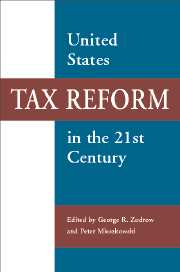Book contents
- Frontmatter
- Contents
- List of Contributors
- Preface
- 1 Introduction: The Fundamental Question in Fundamental Tax Reform
- 2 Behavioral Responses to a Consumption Tax
- 3 The Economic Impact of Fundamental Tax Reform
- 4 Capital Income Taxation in Tax Reform: Implications for Analysis of Distribution and Efficiency
- 5 International Aspects of Fundamental Tax Reform
- 6 Distributive Analysis of Fundamental Tax Reform
- 7 The Role of Administrative Issues in Tax Reform: Simplicity, Compliance, and Administration
- 8 Evaluating the National Retail Sales Tax from a VAT Perspective
- 9 Transitional Issues in the Implementation of a Flat Tax or a National Retail Sales Tax
- 10 Historical and Contemporary Debate on Consumption Taxes
- 11 The Politics and Ideology of Fundamental Tax Reform
- Bibliography
- Index
10 - Historical and Contemporary Debate on Consumption Taxes
Published online by Cambridge University Press: 23 October 2009
- Frontmatter
- Contents
- List of Contributors
- Preface
- 1 Introduction: The Fundamental Question in Fundamental Tax Reform
- 2 Behavioral Responses to a Consumption Tax
- 3 The Economic Impact of Fundamental Tax Reform
- 4 Capital Income Taxation in Tax Reform: Implications for Analysis of Distribution and Efficiency
- 5 International Aspects of Fundamental Tax Reform
- 6 Distributive Analysis of Fundamental Tax Reform
- 7 The Role of Administrative Issues in Tax Reform: Simplicity, Compliance, and Administration
- 8 Evaluating the National Retail Sales Tax from a VAT Perspective
- 9 Transitional Issues in the Implementation of a Flat Tax or a National Retail Sales Tax
- 10 Historical and Contemporary Debate on Consumption Taxes
- 11 The Politics and Ideology of Fundamental Tax Reform
- Bibliography
- Index
Summary
Recent debate over fundamental tax reform has centered on consumption taxes. Proposals for thoroughgoing tax reform involving mending of the income tax have been much less in evidence. For example, the U.S. Treasury's proposal for a “Comprehensive Business Income Tax” (see Hubbard, Chapter 4 in this volume) has not generated much interest. Discussion of the relative merits of competing consumption tax proposals has centered on four alternatives: a national retail sales tax, the flat tax, the Unlimited Savings Allowance tax (USA Tax), and the value-added tax. Former chairman of the House Ways and Means Committee Bill Archer has expressed a desire to “tear out the income tax by its roots,” replacing it with a national retail sales tax (a tax on all final sales to consumers). The organization Americans for Fair Taxation (AFT) is the staunchest supporter of a broad-based single-stage national retail sales tax to replace personal and corporate income taxes and Social Security taxes. House Majority Leader Dick Armey is as ardent a supporter of the Hall-Rubushka flat tax as can be found anywhere. The Nunn-Domenici tax on consumption (USA Tax) is the only live proposal for a direct cash flow tax on consumption, but support for the proposal has been largely confined to academic economists. This alternative, along with the AFT proposal for a national retail sales tax, completely defers tax on all income saved, and could allow consumption taxes on low-income households to go to virtually zero.
- Type
- Chapter
- Information
- United States Tax Reform in the 21st Century , pp. 284 - 293Publisher: Cambridge University PressPrint publication year: 2002
- 3
- Cited by

